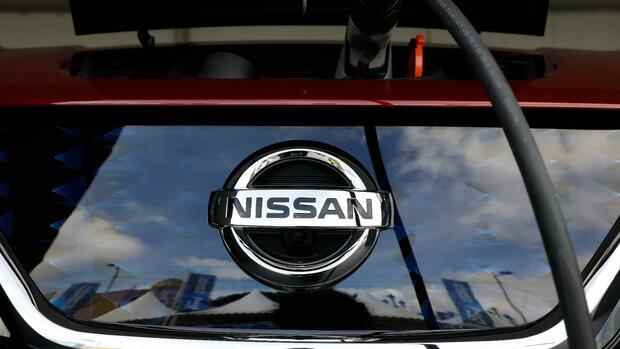Tokyo With breakthroughs in battery technology, Renault’s Japanese partner Nissan wants to accelerate its electric car strategy after years of crisis. In the next five years, the group wants to invest two trillion yen in new technologies and cars, the group announced on Monday during the presentation of its long-term strategy.
The automaker is relying on two technological developments in battery technology to accelerate the shift from combustion engines to electric cars, CEO Makoto Uchida said at an online presentation. “While we are addressing the demand for batteries on the one hand, we also have to take care of battery innovations.”
Specifically, Nissan wants to introduce cobalt-free lithium-ion batteries as well as solid-state batteries developed in-house from 2028, which are considered the next generation of batteries. Because the solid-state batteries have an energy density that is twice as high as previous lithium-ion batteries. These two battery technologies are currently the focus of car manufacturers, as they both promise drastically lower battery costs and thus high competitive advantages in the market.
In the short term, manufacturers are looking to replace the expensive metal cobalt that is used in lithium-ion batteries at the cathode. The cobalt alone is as expensive as the rest of the metals used. Tesla founder Elon Musk only promised this new type of battery in September, but without giving a schedule. Nissan has now delivered it: By 2028, the Japanese want to use this new type to reduce battery costs by 65 percent to 75 dollars per kilowatt hour (kWh).
Top jobs of the day
Find the best jobs now and
be notified by email.
With the development of solid-state batteries, the cost of rechargeable batteries would even be reduced to 65 dollars per kWh. This would mean that the cost of an electric car would be on the same level as that of a combustion engine, said Nissan’s Chief Development Officer Kunio Nakaguro. In solid-state batteries, the previously liquid electrolyte is replaced by solid, which has several advantages.
Loading time reduced by two thirds
According to Nissan’s experts, this doubles the energy density of batteries, while the charging time is reduced by two thirds. At the same time, heat management would be simplified, and with it the entire car architecture, said CEO Uchida. Manufacturers can use the advantages to increase the range of electric cars or to drastically reduce the size of the batteries.
Nissan intends to invest in a phase of financial recovery. In the past few years under Carlos Ghosn, the double boss of Nissan and Renault who was pushed away in 2019, the Japanese sank deeper and deeper into the crisis due to quality scandals and problems in the US business.
The arrest of Ghosn and the indictment against him in Japan on allegations of falsification of the balance sheet triggered a leadership crisis at Nissan and Renault. The CEO now believes that both crises have been overcome.
“Nissan will be profitable again in 2021, and we are confident that we will again surpass a profit margin of five percent in 2023,” said Uchida. Therefore, he decided to present a long-term strategy. And the alliance with Renault and the small Japanese automaker Mitsubishi Motors increases efficiency in product development.
Uchida even announced that the three partners plan to jointly invest three trillion yen in the coming years. The details of the plan are to be presented in January 2022. “The alliance is a great strength that other manufacturers don’t have,” said Uchida.
UK electric car hub
Nevertheless, the Japanese pioneer of the electric car wave, burned by its unsuccessful early start, is cautiously looking to the future. As early as 2011, Nissan wanted to create a mass market with its Leaf electric car, without success. Huge investments in our own battery plants had to be written off. Uchida now expects that cars with electrified drives will only account for 50 percent of group sales by 2030.
Uchida did not want to give a date for a final farewell to the internal combustion engine. It would be “driven more by the market,” said Uchida. Customers would decide. “We will adapt flexibly to how customer requirements will develop,” said Uchida.
In the previous plan, Nissan envisages 20 electrified car models by 2026, six of which are battery-electric. By 2030 there should be 23 electrified models, 15 of them purely electric. The start of the new offensive is the crossover Ariya, which is due to hit the streets in Europe in the summer of next year.
The Japanese expect the largest proportion of hybrid and electric cars in Europe, where Uchida has the best funding. Nissan expects that three quarters of all new Nissan models in Europe will be delivered partially or fully electrified by 2026.
This is followed in Nissan’s ranking by Japan with 55 percent and China with 40 percent. However, Nissan sees US consumers as laggards: By 2030, Nissan expects that only 40 percent of customers there will demand electrified cars.
Accordingly, Nissan is stepping up its investments in the production of electric cars in Europe first. At its UK facility, the company is building an “electric car hub” that will include a large local battery plant. Nissan now wants to expand this model from Europe to Japan, China and the USA. Europe will also be the first market outside of Japan in which Nissan plans to set up a plant for the reprocessing of used car batteries as stationary energy storage as early as 2022.
More: Quantumscape, Varta, BYD: The battery hype turns these companies into stock market stars.
